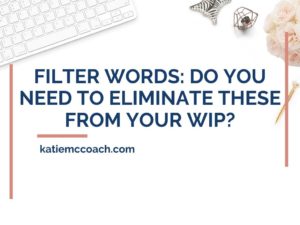
If we’ve worked together at all, you may have heard me mention Filter Words, especially as I recommend against them. I know, mean editor. ☺
Filter words are words that put a filter, and in result a distance, between the character and the reader. Typically, I want my authors to avoid filter words in specific point of views: Third, First, and Second. Omniscient POV is a bit different, so if you write in that, although we still want to limit our filter words, the approach is not quite the same. For First and Third POV (and Second, but this isn’t often used in fiction so I’m not going to continue to mention it), the story is told through one character’s eyes at a time—the story is filtered through them. While this sounds like filter words would be a good thing, the opposite is true.
Filter words remind readers they are reading.
Have you had readers tell you that they just don’t feel that close to the POV character? They struggle to connect? Eliminating filter words is a quick first step. It may not solve the issue, but it will certainly take you a step closer to strengthening the bond between reader and character.
For example, this paragraph includes filter words:
Jenny sat silently and looked over at Mike who sat across from her in the dimly lit restaurant. Mike looked sad; his eyes were cast down and puffy skin bagged under his eyes. She noticed Mike’s hair was sticking up in every direction. She wondered when he last slept.
She remembered her conversation with Fred last night. She wanted to tell Mike about it, but she knew he wouldn’t like what Fred told her.
And this example reduces filter words:
Jenny sat silently across from Mike in the dimly lit restaurant. Mike’s eyes were cast down; puffy skin bagged under them. His hair stuck up in every direction. When had he last slept?
She yearned to tell him about her conversation with Fred last night, but he wouldn’t like what she had learned.
For reference, here’s the first example with filter words italicized:
Jenny sat silently and looked over at Mike who sat across from her in the dimly lit restaurant. Mike looked sad; his eyes were cast down and puffy skin bagged under his eyes. She noticed Mike’s hair was sticking up in every direction. She wondered when he last slept.
She remembered her conversation with Fred last night. She wanted to tell Mike about it, but she knew he wouldn’t like what Fred told her.
When we cut out filter words, we have more active passages that allow the reader to feel completely inserted in the scene. In third or first person POV, everything the character experiences, the reader experiences. For example, using “Jenny saw…” or “Jenny noticed…” is distancing because if the character is describing or mentioning something, since we are in her POV, we know she sees it.
Common filter phrases and words to look out for: continued to, noticed, thought, wondered, saw, felt, looked, remembered, considered, heard, knew, watched, decided, realized, could tell.
Eliminating filter words from your manuscript will do your narration a huge service. Should all filter words be eliminated? Not necessarily. Sometimes they can do a scene a service, when being straightforward can actually add to the tone of the scene. But if you are unsure, write the scene without the filter words. It’s a good exercise, and you can change lines back later if you find it needs that “telling” punch.
The thing is, readers love to forget they are reading. The more they become the story, the less they are reminded they are reading, and thus the deeper they fall into the world you’ve created.
I encourage you do to a sweep for these filter words. Before you start editing them out, do a count. With the Find and Replace tool in Word, you can see how many times you use certain words. Make a list of all the filter words above and tally them up. Then challenge yourself to cut that number at least in half.
For fun, I’d love to do a data count! Fill out this brief form after you do a search on your current WIP and let me know how many times you use some of these filter words. https://forms.gle/Uwz2gNhQdKVpxAVz5
By the way, are you thinking about traditionally publishing? Need help with your query letter? Download my Poppin’ Query Letter template for FREE.
Connect with me on:
Join the FREE Writing with Coach McCoach writing support community HERE.


 Download your free copy of these 8 tried-and-true strategies to stop self-doubt and imposter syndrome as a writer. And, build the power to resist it in the future.
Download your free copy of these 8 tried-and-true strategies to stop self-doubt and imposter syndrome as a writer. And, build the power to resist it in the future.